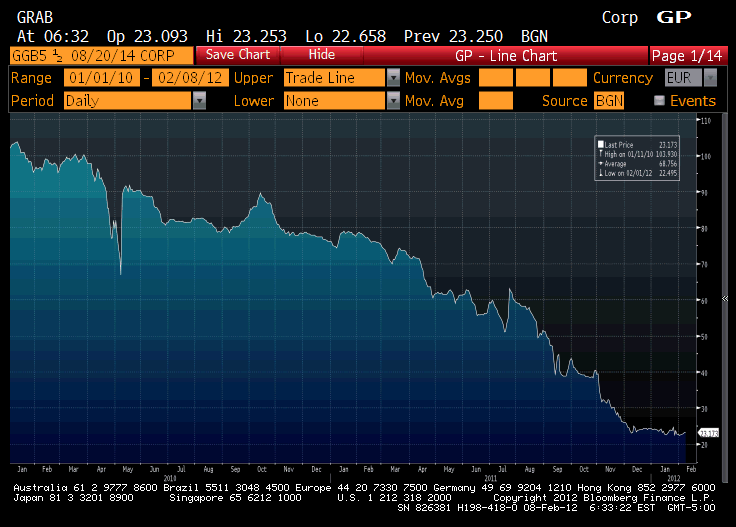The ECB’s Scary Carry Trade
According to the WSJ, the “ECB is willing to forego profits on their Greek bonds”.
That statement strikes me as one of the scariest things that a central banker could say (and there is some tough competition for that one).
Forego profits? Here is the chart of a typical Greek bond over the past 2 years. The ECB started buying Greek bonds in May 2010, and stopped sometime in 2011.
How do they possibly have “profits” to give up?
They have “profits” because they live in an accrual accounting world. They buy bonds, don’t mark them, and accrue the interest. The accrued interest counts as “profit”. That is the carry trade. That is what everyone is so excited about for the banks. Banks can buy bonds, not mark them, and book the interest accrual (and payments) as profit.
The problem with accrual accounting is when a sale is forced. Whatever the reason for the sale (in this case, a restructuring/default by Greece), the accrual accounting game is over and you have real profit or loss. The “profit” is the total proceeds received for the sale, versus total purchase price, plus any coupon payments received, minus costs of carrying the position.
Some entity is taking the real world loss. These bonds were bought at prices far above their current value. Since most Greek bonds only pay interest annually, there may be a lot of accrued, but unpaid interest that will also be lost.
It strikes me as very scary that the central bankers seem more comfortable in an accrual accounting world. It is also scary that all future policies seem to be based on an attempt to show that all prior policies worked whether or not they did in reality. It also explains why they are so comfortable with plans out to 2020 when Greece just missed their projections for January by €1 billion.
Can’t wait to see the details of this plan, but can’t imagine that we won’t be discussing a second round of restructuring or default before long.

